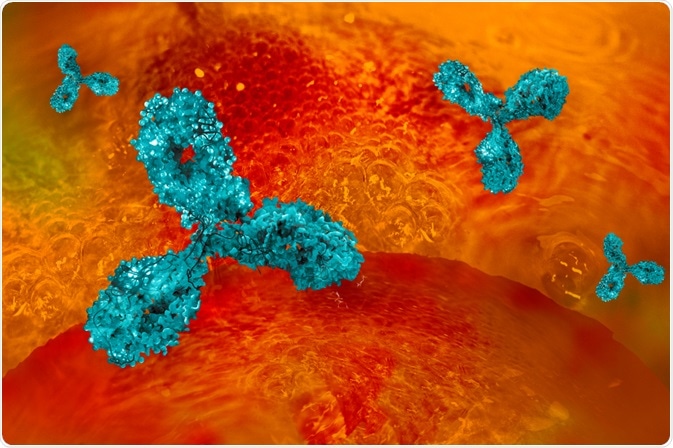What are antibodies and how do they work?
Antibodies, also known as immunoglobulins, are Y-shaped proteins produced by the immune system to recognize and neutralize foreign, potentially-harmful materials such as viruses and bacteria. Each antibody recognizes a specific molecule, called an antigen. An antibody is made up of two main regions - an antigen-binding fragment (Fab) and a constant region (Fc). Fab is highly variable and this allows specific binding of each antibody to its respective antigen.
Antibodies are produced by specific immune cells called B cells. Initially, antibodies are attached to the surface of a B cell, referred to as B-cell receptors (BCR). When the BCR binds to an antigen, the B cell is then activated and proliferates into either plasma cells, which mass-produces soluble antibodies to be secreted, or into memory B cells, which survives in the body for long-term immunity.
The main functions of antibodies include (1) neutralizing pathogens by blocking parts of the surface of the pathogen to make it unable to attack; (2) agglutinating pathogens together to make them easy targets for immune cells such as macrophages; (3) activating the complement system, which is part of the immune system that attacks pathogens by forming a pore-forming membrane complex.
A monoclonal antibody (mAb) is an antibody derived from the cloning of a single B cell. In other words, mAbs are identical and can be traced back to a single parental cell. They only recognize one specific antigen. Whereas polyclonal antibodies can recognize different antigens and are usually produced by different parental cells. Monoclonal antibodies can be mass-produced and engineered for laboratory and medical purposes.

Monoclonal Antibodies. Image Credit: Mirror-Images/Shutterstock.com
How are monoclonal antibodies produced?
Monoclonal antibodies are produced by hybridomas, a type of hybrid cells. Hybridomas are made by fusing an antibody-producing cell to a tumor cell called a myeloma cell. This allows unlimited division of the antibody-producing cell, and hence mass production of specific antibodies.
Applications of monoclonal antibodies
The use of mAbs varies from laboratory settings to clinical settings. In the laboratory, mAbs are used for the detection of molecules. This is especially useful in diagnostic tests and protein detection.
As mAbs bind to specific molecules, they can be linked to signaling proteins such as horseradish peroxidase (HRP), and once bound to the targeted molecule, release a detectable signal for identifying the presence of the targeted molecule. This method is commonly used in Western blots and immune dot blot tests to detect substances present in live cells, cell lysates, supernatants, or frozen tissue sections.
In the clinical setting, mAbs can function in several different mechanisms, such as blocking of targeted molecule functions, modulating cell signaling pathways, and inducing cell death in cells producing the targeted molecules.
One of the cancer treatments utilizes mAbs to target antigens specifically found on the surface of cancer cells. They can then induce an immune response to attack the cancer cells, or the mAb can be engineered to be linked to a drug and deliver the drug into the cancer cells to kill the cells.
Another application of mAbs in clinical settings is to treat autoimmune diseases. An autoimmune disease is when the body’s immune system attacks its own cells and causes excessive inflammation.
Monoclonal antibodies can bind to and inhibit chemical signals that lead to inflammation, thus relieving symptoms of the autoimmune disease. For example, some drugs inhibit TNF-a and are effective in treating diseases such as Crohn’s disease and rheumatoid arthritis.
References:
- Bordeaux, Jennifer, Welsh, Allison W, Agarwal, Seema, Killiam, Elizabeth, Baquero, Maria T, Hanna, Jason A, . . . Rimm, David L. (2010). Antibody validation. BioTechniques, 48(3), 197-209.
- Cymer, Florian, Beck, Hermann, Rohde, Adelheid, & Reusch, Dietmar. (2018). Therapeutic monoclonal antibody N-glycosylation – Structure, function, and therapeutic potential. Biologicals, 52, 1-11.
- Ecker, Dawn M, Jones, Susan Dana, & Levine, Howard L. (2015). The therapeutic monoclonal antibody market. MAbs, 7(1), 9-14.
- Grilo, António L, & Mantalaris, A. (2019). The Increasingly Human and Profitable Monoclonal Antibody Market. Trends in Biotechnology (Regular Ed.), 37(1), 9-16.
Further Reading
Last Updated: Feb 5, 2021